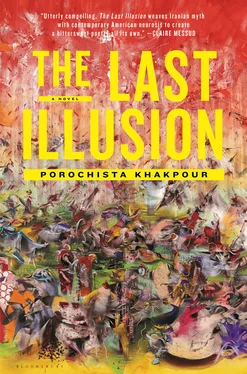She was bound to burn out on it, that she knew the whole time. But she kept waiting for something to take her out of it, something to fill the hole, another tug in another direction, and then it came.
It came in the form of religion. God came.
It began with Patrick, one of her exes — a senior publicist at a high-powered fashion PR house, whom she always suspected was gay — who turned her on to Buddhism. And she tried it and fell in love with it, and then after a season she began to find holes, that it was full of holes — all holes, even — just too bleak for her still hopeful heart, and that this god left her more empty-feeling than the lack of a god altogether. Months later, she met another guy who dabbled in Hare Krishna ideology, an artist whose name she could never remember, not then nor now, and she was fascinated but eventually found the whole thing — all the freakish superpowered animals and their supernatural feats and the Technicolor paintings and madcap mantras — entirely too psychedelic, making her feel somehow conservative, practical, and black-and-white-souled by comparison. As an insult, he mentioned she’d make a good Catholic, though that had its imagery, too. Still, she took Catholicism on for a season, even attending church, until she decided that she, hater of all authority, could never stand for its hierarchies — plus, sometimes at night her mind played Sinead O’Connor’s Saturday Night Live pope-photo-tearing appearance over and over and over in a loop.
She kept wearing these religions, taking them on and off as though they were a style choice, until she got to Islam. Against all odds, it was there that Daisy McDonald found her match.
She went to a mosque in Brooklyn, where men and women sat separated, where she found her hair suddenly bound beneath a scarf, where they ate and drank and sang and cried all on their knees. She soon became enamored with a Moroccan graffiti artist named Moe — short for Mohammed — who joked that since he had Americanized his name, it only made sense that she should Arabicize hers. And so he took the letters of her name, tagged it over and over in all sorts of incarnations, and finally stumbled on Asiya.
She mouthed it slowly. AWE-see-yah . The word required a mostly open mouth, barely touching down for sibilance’s sake — unlike her own name, which almost required a clenched jaw or at least an insincere smile. Asiya was all sorts of things Daisy was not: velvet, ebony, forest, avian, paranormal. Asiya was beautiful.
What does it mean? she asked.
He shrugged. Hell if I know.
She looked it up. It was apparently Arabic for “healer,” a caretaker of the ailing, something she never was and never could imagine being, though her future would involve all sorts of ailing people like Willa — who was just about to be resigned to a bed — and Zal, who was the most miraculous of handicapped people. Asiya was one of the four most sacred women of Islam, the Pharaoh’s Israelite wife, who adopted Moses after servants found him afloat in a crate upon the Nile. In the end, Asiya incurred the wrath of the Pharaoh with her monotheism. She was tortured and killed by the Pharaoh but was also among the first women to enter heaven for believing in one God. Her story was part tragedy, part triumph.
Daisy took on the name Asiya with a solemn appreciation, and just as she became Asiya, everything began to change. She began to digest the world differently, she began to take it in and turn it out in a whole other manner. She began, she felt, to be in control of the world in a way. It did not alarm her, but rather seemed logical: taking in God as a true believer, becoming one of them from heart to appellation, had to be intense. The story was being written from scratch, her whole universe was being created before her. Perspective was the least of the benefits Asiya McDonald was due to acquire.
She had her name legally changed.
Eventually Moe broke her heart by giving in to his parents’ choice for a girlfriend, who soon became his wife, a beautiful also-Moroccan girl named Ayesha, who eyed Daisy — Asiya — with only suspicion. But really, Ayesha would prod, what made you come here? Why did you want to be one of us?
Asiya didn’t know what to say exactly. I think I love Islam, she said, with less certainty than she wished was true.
Without Moe, she began trying to get to know more men from the mosque, hanging out after prayer meetings and following them to local cafés. She got a reputation at the mosque as the white girl who was trying to get their men . She once heard a friend of Ayesha’s say loudly in English: The little she-devil thinks this is a man-whore-house! But they all know she can’t compete.
And apparently it was true. While she fascinated many of the men at first, her cloying presence, like a department store fragrance one gets showered with at the urging of the perfume counter lady, soon became too much for them. There were only a couple white men there at the time and no white women except for her. A few started to wonder what her business was, if there was something more sinister. But most just found her annoying, parasitic, lost, and desperate. They felt it was more new company, not God, that she craved, even though she would vehemently deny it when they’d suggest it with a leading question or two.
Years later, no longer Muslim, but not willing to abandon that beautiful name, she would still deny it. The men were part of the package, but it was God that held all the allure for her. Even though her stint as a Muslim believer had lasted just over a year, she missed believing in something, or at least trying to.
And she credited Islam for being what opened her to something greater, made her suddenly a receptacle for visions of sorts. It was during the time she was studying the Koran that she started have feelings about things, to the point that she would call them premonitions. If it weren’t blasphemous to imply it, she’d say that she became a Muslim mystic and then simply a mystic. That gift did not leave her, no matter what God she held on to.
And yet at the end of millennium, when the Season of Fear came over them all, that was her thought: that they were all in it as deeply as her — so strongly, so unsubtly, she did not know how to feel any more than anyone else did. She became obsessed with it, but what was It? It was formless, a great question mark, a blurry unknown. Something, they said, was going to happen. What? She went through various stages of attraction and revulsion at the very thought of It, but the stage she was in when Zal met her manifested itself physically and most innocuously: under her sleeve was a cross, a Star of David, and an Allah pendant, symbols of nothing she believed in but of a prudent just-in-casery, an acknowledgment of a world where anything is possible. She wore them on a chain around her wrist, a most apt place, she thought, for such symbols to be bound.

Zal, of course, saw none of this — just a plain figure, very thin, barely a girl, a black-and-white scrawl no more adorned than a classic stick figure, pale face wrapped in a black hooded sweatshirt and dark jeans and sneakers — when they met on December 31, 1999, in broad daylight on a sidewalk near Zal’s apartment. He had seen that black figure drop to her knees before him, as if in collapse, and he had stopped. But she was examining something, kneeling over some object of interest on the sidewalk, a black thing.
It took Zal more than a few moments before he realized it was a dead bird.
Zal had been tossing coins all day — heads, tails, heads, tails — about Silber’s NYE party. So the first thing that crossed his mind: not going.
Читать дальше













